Postal address: Stockholms Universitet, SE-106 91, Stockholm, Sweden
Visiting address: Frescativägen 54
Web page: http://www.interped.su.se/
Contact person: Professor Vinayagum Chinapah, Head, IIE, & Chair of International and Comparative Education, Dept. of Education, phone: + 46 (0)8 16 1064
The Institute of International Education is one of the few institutes in the Nordic countries specializing in International and Comparative Education. After more than thirty years in this field, IIE is now well recognized for its contribution to research and training. IIE is an ”international” institute, in the true meaning of the word. It has successfully created a multi-cultural and multi-disciplinary research and teaching environment which attracts a number of visiting scholars and lecturers as well as students from many parts of the world.
At Advanced level we give several singles courses, one Master’s programme and a PhD programme. Moreover, the Institute is active in several international networks of researchers and practitioners in the field of education. The IIE was founded in 1971 as an answer to the increasing demand for a more international outlook and a comparative approach in educational research. Since 2006 the IIE makes part of the Department of Education.
IIE is part of the Department of education, Stockholm University.
More information about South Asia related research at the Dept. of Education.
IIE research connected to South Asia
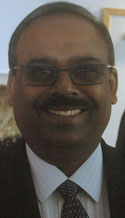 In December 2009, Prof. Vinayagum Chinapah received SEK 600 000 as a three-year grant from the Swedish Research Links programme (funded by Sida and the Swedish Research Council) for a comparative India/China related project entitled ”Education for Rural Transformation in China and India: A Comparative Study of Role of Education in Rural China and India”. See the full list of South Asia related projects given Swedish Research Links gants 2009.
In December 2009, Prof. Vinayagum Chinapah received SEK 600 000 as a three-year grant from the Swedish Research Links programme (funded by Sida and the Swedish Research Council) for a comparative India/China related project entitled ”Education for Rural Transformation in China and India: A Comparative Study of Role of Education in Rural China and India”. See the full list of South Asia related projects given Swedish Research Links gants 2009.
The study is conducted jointly by IIE, China National Institute for Educational Research (CNIER) and the Maharaja Sayajirao Baroda University, India (Faculty of Education and Psychology). Researchers in Sweden, China and India work on agreed themes or research problems. IIE is responsible for the conduct and collective write-ups, publications and disseminations of the comparative research outcomes and country case studies. The main collaboration partner on the Chinese side is Prof. Nan-zhao Zhou at the China National Institute for Educational Research in Beijing, China. The project will end on 31 December 2012.
Abstract: Any attempt at redressing our world increasing poverty and widening human development gaps is only possible through access to relevant, equitable and effective education of our rural people who makes our world’s majority of illiterate, unhealthy, malnourished, marginalized, and oppressed population. Their numbers are increasing at a rocket pace and yet very little research is looking at causes and roots of such deteriorating situations. There is no better way to re-visit the failures of conventional educational deliveries in the rural areas other than to carry out a comparative research study using both quantitative and qualitative research methods in the two most populous countries of our world, namely China and India. Both are confronting rural poverty, environmental challenges, health problems, and gender inequality.
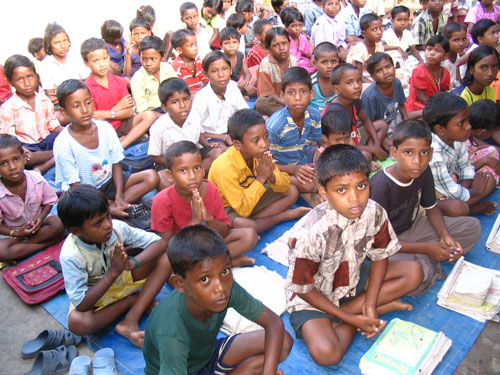 Education for rural transformation is the only way to reduce the widening human development gaps within and between nations. The dynamics of rural transformation in the ”globalized” world has created new educational imperatives that call for a re-evaluation of present educational policies and priorities and the re-examination the role of education for rural people from rather new perspectives. There is therefore an urgent need for an in-depth comparative study of China and India using different but complementary research methods to assess the current situations, problems and trends in education for rural transformation and to raise the awareness of the necessity of educational reform in largely populated countries. It is vital to understand the roots and the causes of failures of existingeducational structures, contents, and methods in rural areas, and to identify good practices of educational empowerment and practical-needs-based education for rural transformation.
Education for rural transformation is the only way to reduce the widening human development gaps within and between nations. The dynamics of rural transformation in the ”globalized” world has created new educational imperatives that call for a re-evaluation of present educational policies and priorities and the re-examination the role of education for rural people from rather new perspectives. There is therefore an urgent need for an in-depth comparative study of China and India using different but complementary research methods to assess the current situations, problems and trends in education for rural transformation and to raise the awareness of the necessity of educational reform in largely populated countries. It is vital to understand the roots and the causes of failures of existingeducational structures, contents, and methods in rural areas, and to identify good practices of educational empowerment and practical-needs-based education for rural transformation.
The design for this comparative research study is based on both quantitative analyses on survey data to be collected through questionnaires that are to be filled by students at grade 9, their teachers and school leaders, parents of students and head of village and in-depth qualitative case studies (field visits, interviews and participant observations) in some selected rural areas. The study will be conducted in selected 20 sample villages and their schools in China and India respectively. The selection of villages and the selection of schools within selected villages will be done according to differential levels of development both countries from developed regions to remote and less developed regions. In every sampled school, some 30 students will be randomly selected as well as their school heads, teachers and parents for both quantitative and qualitative data collection processes.
At the end of the 3-year comparative research study, new empirical evidence will be found on the different impacts that education can have on the process of rural transformation. The relevance of the educational system and sub-systems in benefiting rural people will be thoroughly examined at the grass-roots levels. For instance, how education is contributing towards training for rural youth through the school curriculum, civic education, revival of local craftwork and cultures and through non-formal and informal educational organizations.
The comparative study of China and India on education for rural transformation is of great importance for the world. The experiences and lessons learned will be of high-value added to other countries and their majority poor and rural population. The research outcomes may further provide insights for other similar large-populated countries such as Bangladesh, Brazil, Egypt, Indonesia, Mexico, Nigeria, and Pakistan.
An International Symposium entitled ”Education For Rural Tranformation (ERT)” was held in Stockholm 8–10 November 2010. It was being organised by Professor Vinayagum Chinapah. The symposium will build upon results from the ongoing research project, but also on the ERT report that was prepared by researchers under the auspices of UNESCO International Research and Training Center for Rural Education (INRULED) in 2001 (read the report).
IIE sponsored some 8-10 international participants mostly from India and China and selected invited resource persons. The extensive list of seminar participants and speakers included Dr. Pushpanadham Karanam and Prof. Sudarshan C. Panigrahi,Maharaja Sayajirao University of Baroda; Prof. K. Sujatha, National University of Educational Planning and Administration, New Delhi; Prof. Ranjit Singh Ghuman, Punjabi University, Patiala; and Mr. Jibachh Mishra, Director, Non Formal Education Centre, Kathmandu, Nepal.
The papers and contributions from this ERT Symposium will later be published. Professor Zhou Nanzhao will coordinate the country thematic papers and contributions from China, Dr. Pushpanadham, for the country thematic papers and contributions from India, and Professor Vinayagum Chinapah for the international thematic papers and contributions.
More information including full programme.
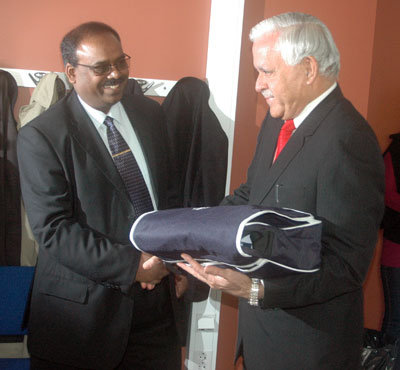 Shortly before the big conference, Prof. Chinapah and the Institute of International Education, Stockholm University, hosted a half-day seminar on Mahatma Gandhi, organised for students and invited guests by the Embassy of India in Sweden, including diplomatic representatives from several countries. SASNET was represented by its deputy director, Mr. Lars Eklund.
Shortly before the big conference, Prof. Chinapah and the Institute of International Education, Stockholm University, hosted a half-day seminar on Mahatma Gandhi, organised for students and invited guests by the Embassy of India in Sweden, including diplomatic representatives from several countries. SASNET was represented by its deputy director, Mr. Lars Eklund.
The seminar, held on Monday 1 November 2010, was entitled ”Is the Mahatma still relevant?” and featured presentations by Prof. Chinapah and the Ambassador H.E. Mr. Ashok Sajjanhar (seen on the photo to the right).
Two other prominent speakers with a deep knowledge of Mahatma Gandhi were invited to elaborate on the subject, namely Prof. Björn Wittrock from Uppsala University, Principal of the Swedish Collegium for Advanced Study (SCAS); and Prof. Emeritus Ishtiaq Ahmed, Dept. of Political Science, Stockholm University.
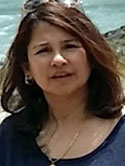 Since September 2011, PhD Candidate Khaleda Gani Dutt(photo) works on a PhD project focusing on inaccessibility to primary education arising out of poverty, accentuated by gender constraints manifest in societal constructs. She studies Indian government and the Gujarat state government programmes and policies designed for ameliorating the problem. She defended her India related MSc thesis entitled ”Gender Equity in Education: A Study on the Government Policies and Ground Realities” in 2009. The thesis was a case study of four elementary schools in Vadodara District, Gujarat, India. It was published as a book in early 2012, as Voume No 5 of the publication series of Master’s Degree Studies in International and Comparative Education.
Since September 2011, PhD Candidate Khaleda Gani Dutt(photo) works on a PhD project focusing on inaccessibility to primary education arising out of poverty, accentuated by gender constraints manifest in societal constructs. She studies Indian government and the Gujarat state government programmes and policies designed for ameliorating the problem. She defended her India related MSc thesis entitled ”Gender Equity in Education: A Study on the Government Policies and Ground Realities” in 2009. The thesis was a case study of four elementary schools in Vadodara District, Gujarat, India. It was published as a book in early 2012, as Voume No 5 of the publication series of Master’s Degree Studies in International and Comparative Education.
During the period 2010-11, Khaleda worked as a Research Assistant at the Institute under Professor Vinayagum Chinapah. This was in conjunction with the project on ”Education for Rural Transformation in India and China”.
Khaleda participated in SASNET’s first Falsterbo conference for young Nordic South Asian studies scholars, held in August 2009. More information about the conference.
Khaleda’s PhD project is entitled ”Education for Rural Transformation – Gender Equality Matters! Comparative Case Studies in India”.
Abstract: Education is elicited as one of the most powerful drivers of development and one of the strongest instruments for reducing poverty and improving health, gender equality, peace and stability. Although women’s lives have improved greatly the past decades, things have not changed for all women or in all aspects of gender equality (World Bank, 2009). A sizeable gender gap continues to exist for poor women and women living in poor places in spite of increasing enrolment in schools. Globally, the gender gap has been gradually shrinking since 1999. But statistics on access and achievement give us only very partial accounts of the nature of gender inequality. In spite of a booming economy, 1.2 billion of India’s population has a per-person income of less than US$1. About two-thirds of the population depends on rural employment to make a living, yet educational opportunities and access is uneven at best and marked by wide regional disparities. 20 per cent of children aged 6 to14 are still not in school and millions of women remain illiterate despite the spurt in female literacy in the 1990s. Several problems persist: issues of ‘social’ distance – arising out of caste, class and gender differences – deny children equal opportunities. Child labor in some parts of the country and resistance to sending girls to school remain real concerns.
The overall aim of this research is to showcase ‘good practices’ in education for rural transformation having as its primary focus the agencies which empower marginalized women and girls. The research endeavors to talk about successful practices in government and non-government organizations, institutions and the community which have been able to promote, coordinate and implement effectively sector-wide approach and policy reforms to achieve gender equality in elementary education in the states of Gujarat, Uttar Pradesh, Andhra Pradesh and West Bengal.
During October 2014, Khaleda Gani spends a month at Nordic Institute of Asian Studies in Copenhagen, as a NIAS/SUPRA scholarship holder. While being in Copenhagen she also visited SASNET in Lund. See a report from the visit.
Previous research projects
Since 1 January 2008, the Afghanistan collaboration project through the Asia Link Programme (mentioned below) has moved out of IIE. Instead the project is run by Dr. Pia Karlsson at Karlstad University, to where she has moved. Professor Emeritus Holger Daun at IIE is however also still involved in the project. As part of the project, teachers from the collaborating partner universities in Germany, Finland and Nepal have gone to Karlstad during 2008. More information on the SASNET page about Educational Work, Organisation and Society; Faculty of Arts and Education, Karlstad University.
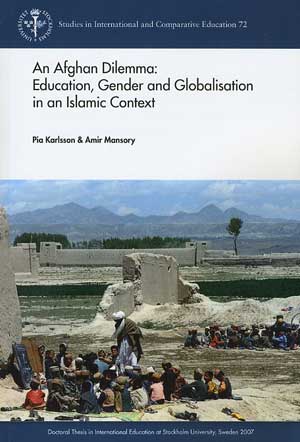 On Friday 2 November 2007 Pia Karlsson and Amir Mansory defended their joint doctoral project. The PhD thesis is titled ”An Afghan Dilemma: Education, Gender and Globalisation in an Islamic Context”. The faculty opponent was Prof. David Stephens from the School of Education, University of Brighton, United Kingdom.
On Friday 2 November 2007 Pia Karlsson and Amir Mansory defended their joint doctoral project. The PhD thesis is titled ”An Afghan Dilemma: Education, Gender and Globalisation in an Islamic Context”. The faculty opponent was Prof. David Stephens from the School of Education, University of Brighton, United Kingdom.
Abstract: The thesis deals with the socialisation process of rural village girl students in Islamic education and ‘Modern’ education from a holistic and ecological development perspective. Islamic education (mosque schools and madrasas of various types) and ‘modern’ education (primary level) with regards to goals, aims and functions, particularly in relation to female education will be described. Of particular interest are views on knowledge and learning in the two educational systems especially in relation to female education. The teaching-learning processes in the two educational systems as observed in classroom practices, especially girls’ education is studied. Read the abstract of the thesis.
Previously Dr. Mansory held a MA degree from 2000, when he wrote a thesis titled ”Mathematics Achievements among Afghan Primary School Children”. He has also a MSc in engineering from Poland in 1982. Amir originally comes from Afghanistan, and is presently working for the Ministry of Education in Kabul. He is heading the Education Programme which is supported by the Swedish Committee for Afghanistan. He carried out his PhD studies on part time basis and visited the IIE 2-3 times per year.
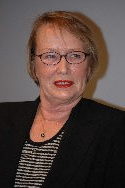 Dr. Pia Karlsson (photo to the left) was also a PhD Student at IIE since 2001, holding an MA degree titled ”Wastes or Gains? A discussion about the concept Educational Wastage with examples from Afghanistan”. Pia worked as Education Advisor with the Swedish Committee for Afghanistan during the period 1996–2000. Besides studying she has worked as an aid consultant and has experience from Afghanistan, Pakistan, Guinea-Bissau, Cape Verde, Angola and other countries.
Dr. Pia Karlsson (photo to the left) was also a PhD Student at IIE since 2001, holding an MA degree titled ”Wastes or Gains? A discussion about the concept Educational Wastage with examples from Afghanistan”. Pia worked as Education Advisor with the Swedish Committee for Afghanistan during the period 1996–2000. Besides studying she has worked as an aid consultant and has experience from Afghanistan, Pakistan, Guinea-Bissau, Cape Verde, Angola and other countries.
The joint PhD project was first presented at the Development studies research conference held at Lund University in January 2003, wher Pia Karlsson presented the project in a paper called ”Islamic and Modern Education in Afghanistan – Conflictual or Complementary?”. Read the abstract.
The research project was financed by grants from Sida/SAREC. In January 2003 they also received a SASNET grant for the the planning of the research project, then titled ”Education in Afghanistan”.
In 2004 Pia Karlsson and Amir Mansory conducted two case studies in two villages, one in the north and one in the south of the country, where parents, students, teachers, mullahs and elders were interviewed.
Some preliminary findings are: 1) Education is held in extremely high esteem. The trust on education has definitely returned. Only a handful of parents did not send their children to school. 2) There seems to be a breakthrough for girls’ education. There was a general consensus that girls and boys have the same right and the same need for Islamic as well as Western style education, only that girl schools must be run under certain conditions: in separate classes and with female teachers. 3) Islamic education has some pedagogical advantages to be borrowed by primary education. 4) A general view is that Islam cannot be separated from education. The mosque school (or madrasa) was considered as a necessary complement to the primary school but teaching about Islam was required also in the western style school. 5) Education risks a new backlash, mainly for two reasons: a) The new curriculum has considerably decreased the Islamic subjects in primary school. b) The poor quality (over-crowded classes, unqualified and inexperienced teachers poor organisation and administration of schools) may cause reactions of disappointment, resignation and questioning of the usefulness of education.
In August 2004 Mansory and Karlsson got a separate SASNET planning grant for a project on ”Opportunities and Obstacles for Girls’ Education in Rural Afghanistan a project including capacity development of Afghan Educators”.
The purpose of this new project was to explore possibilities of future cooperation between the Institute of International Education and an education institution in Afghanistan, other than Kabul University. Once such a collaboration has been established the project aims at training and upgrading Afghan educators in research methodologies, while simultaneously studying the hindrances that affect girl’s participation in education. The networking was carried out by Mansory, Karlsson and Professor Holger Daun, and involved contact journeys to the universities of Jalalabad and Mazar-e-Sharif in April 2005. Moreover, they wished to explore the interest among potential financiers for a project. The delegation from IIE met with several education institutions in Afghanistan and a number of meetings were held with national authorities, organizations and donor agencies, among others Ministry of Higher Education, Faculty of Education at Kabul University, the newly established Institute for Policy Research at Kabul University, University of Education in Kabul, UNESCO, NORAD and DANIDA. They also spent one day in Jalalabad, visiting the Faculty of Education of Nangarhar University.
The positive response was unambiguous; from governmental authorities to individual teacher trainers the interest was overwhelming. Already at the initial meeting they found the faculty in Jalalabad very interesting and eventually discussions ended up in a tentative project proposal.
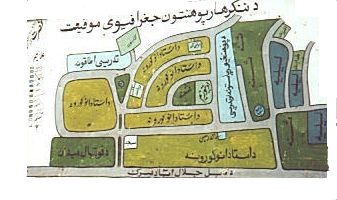 The Faculty of Education at Nangarhar University (FoE/NU) has, as practically all higher institutions in Afghanistan been cut off from external inputs and support since the mid-seventies. Being a university outside the capital (it is located around 150 km south of Kabul) this situation is by and large remaining; the major bulk of assistance goes today to Kabul institutions. This fact is actually one of the reasons for opting for FoE/NU. More important though, is the fact that FoE/NU has long experience of teacher training; for many decades teachers and principals for primary and secondary schools have been trained, even during the hard and long years of war. FoE/NU is the second oldest university in Afghanistan and had until recently three institutions, Teacher Training College, Faculty of Education and Institute of Pedagogy. All three are now joined into the Faculty of Education. In addition, a specialized unit for Educational Psychology has also been established. The main activities include training of teachers for primary and secondary level but also education administrators, planners and managers will get training there. At present, there are 750 teacher students enrolled, out of which 200 are women. Some 500 students belong to an in-service training programme. The training lasts for four years. The teaching staff includes 50 members. A considerable number of young teachers and lecturers has recently been recruited, many of whom have their education from Pakistani universities. The majority of the participants to be recruited for the capacity building will be found among the staff from the FoE/NU.
The Faculty of Education at Nangarhar University (FoE/NU) has, as practically all higher institutions in Afghanistan been cut off from external inputs and support since the mid-seventies. Being a university outside the capital (it is located around 150 km south of Kabul) this situation is by and large remaining; the major bulk of assistance goes today to Kabul institutions. This fact is actually one of the reasons for opting for FoE/NU. More important though, is the fact that FoE/NU has long experience of teacher training; for many decades teachers and principals for primary and secondary schools have been trained, even during the hard and long years of war. FoE/NU is the second oldest university in Afghanistan and had until recently three institutions, Teacher Training College, Faculty of Education and Institute of Pedagogy. All three are now joined into the Faculty of Education. In addition, a specialized unit for Educational Psychology has also been established. The main activities include training of teachers for primary and secondary level but also education administrators, planners and managers will get training there. At present, there are 750 teacher students enrolled, out of which 200 are women. Some 500 students belong to an in-service training programme. The training lasts for four years. The teaching staff includes 50 members. A considerable number of young teachers and lecturers has recently been recruited, many of whom have their education from Pakistani universities. The majority of the participants to be recruited for the capacity building will be found among the staff from the FoE/NU.
Back in Sweden, contacts with NORAD in Oslo, and Sida in Stockholm has however turned out to be unsuccessful. No funding could be procured from any Nordic agency for this project.
In 2007, IIE managed to secure Euro 750 000 as an Asia Link Programme from the European Commission to fund a collaboration project with Nangarhar University in Jalalabad. The project also involves three other universities, Bochum University in Germany, Tampere University in Finland and Kathmandu University in Nepal.
Other South Asia collaboration projects
The Institute of International Education has established a collaboration agreement with the University of Baroda in India. The collaboration has been funded by grants from the Swedish Institute. During 2007 and 2008, Assistant Professor Karanam Pushpanadham from the Maharaja Sayajirao Baroda University visited Stockholm on several occasions. He was connected to IIE as a visiting researcher. While in Sweden, he made studies on leadership in four upper secondary schools in the Stockholm region.
In the Fall 2008, Prof. Hans Ingvar Roth from IIE also visited India. He went there as a representative of the Stockholm School Authority, that also is involved in a collaboration project with Indian schools.
On 1 January 2009, Prof. Roth moved to Lund University where he has got a professorship in Human Rights, at the Centre for Theology and Religious Studies, Lund University, but has since moved back to Stockholm again.
Linnaeus Palme collaboration with Kathmandu University
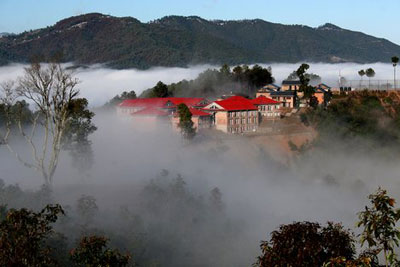 From 2012-13, IIE launches an educational collaboration with Kathmandu University in Nepal, through a Linnaeus Palme Exchange Programme. The project has been awarded initial funding with SEK 80 000. Professor Vinayagum Chinapah is the contact person on the Swedish side, whereas Professor Mahesh Nath Parajuli at the School of Education (KU-SOED), Kathmandu University is the contact person on the Nepalese side.
From 2012-13, IIE launches an educational collaboration with Kathmandu University in Nepal, through a Linnaeus Palme Exchange Programme. The project has been awarded initial funding with SEK 80 000. Professor Vinayagum Chinapah is the contact person on the Swedish side, whereas Professor Mahesh Nath Parajuli at the School of Education (KU-SOED), Kathmandu University is the contact person on the Nepalese side.
The long-term goal of this cooperation is to enhance the quality of education and further strengthen, broaden and upgrade the cooperation in academic, pedagogical and international perspectives – on an equal footing – to achieve mutual benefits and win-win outcomes and to realize common capacity development of 1) both institutions, i.e., IIE and KU-SOED, and 2) their individual participants, e.g., teachers, students and administrators, etc. The overall expected result foreseen during the planning trips from the perspective of IIE, Department of Education, Stockholm University and its participants is the establishment of a foundation and starting point for further upgrading and broadening of research and teaching activities and methods by interaction and exchange of experiences with KU-SOED, Nepal.
More precisely, the expected results may be, but not limited to, as follows:
1. The cooperation at the institutional level legally established, a MoU signed by both institutions after face-to-face brainstorming, and the focused areas of long-term collaboration singled out and specified;
2. Planning trips completed with two Swedish participants visiting Nepal, and two Nepalese participants visiting Sweden;
3. Seminars or lectures given by Nepalese visitors to IIE as well as the department;
4. Initial investigation and participant observation of pedagogy, from course planning to assessment and evaluation, and organizational culture of KU-SOED, Nepal;
5. Jointly written research proposals submitted to national or international bodies;
6. Articles received from Nepalese scholars submitted to or published in IIE Series;
7. Joint publications submitted to or published in international journals;
8. Co-presence in international conferences of common interests, e.g., ERT symposium;
9. The framework of teacher and student exchanges worked out, and the model of exchanges tested and improved;
10. Experience and ideas drawn from the initial investigation of Nepalese curriculum of Master degree of environmental education and sustainable development and distance education.
The projcet was granted SEK 134 640 from the Linnaeus Palme fondation for 2014-15.